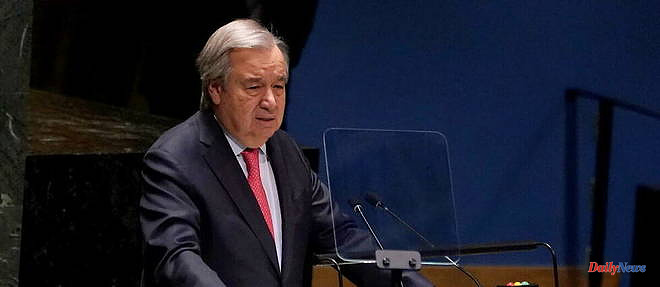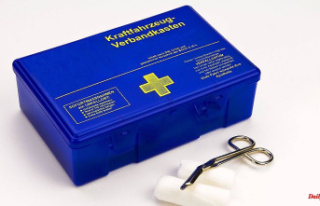A year of war in Ukraine. This will be the main topic of the session of the United Nations (UN) General Assembly which opens this Wednesday, February 22, and where Kiev and its allies are hoping for massive support for a resolution calling for a "just and lasting peace. ". Also, at the opening of this diplomatic meeting, the secretary general of the organization, Antonio Guterres, denounced "an affront to our collective conscience".
“The first anniversary of Russia's invasion of Ukraine represents a dark milestone, for the Ukrainian people and for the international community. This invasion is an affront to our collective conscience," he said, repeating his fears of an escalation of the conflict. "The possible consequences of the escalation of the conflict are a clear danger and already there," he said, referring to the risks associated with "implied threats" of the use of nuclear weapons and "irresponsible" military activities around nuclear power plants. .
"It is high time to step back from the abyss," he asserted.
After two days of speeches, the General Assembly is expected to vote on Thursday on a resolution that "stresses the need to achieve, as soon as possible, a comprehensive, just and lasting peace in Ukraine in accordance with the principles of the Charter of the United Nations" . Like previous resolutions, all non-binding, the text reaffirms "commitment" to "the territorial integrity of Ukraine", "demands" the immediate withdrawal of Russian forces, and calls for a "cessation of hostilities".
It does not, however, refer to the ten-point peace plan presented in November by Ukrainian President Volodymyr Zelensky. Ukraine gave it up to try to get as many votes as possible in the vote expected on Thursday evening, according to diplomatic sources. At least as many as in October when 143 countries voted for the resolution condemning the annexations of several Ukrainian territories by Russia.
"We have come up with a text that really tries to bring the international community together, to be as coherent and positive as possible," commented a European diplomat.
A year after the invasion of Ukraine, it will also be a message telling Russia that "it cannot achieve its goals by force", he added, hoping that if Moscow "feels truly isolated, at some point the pressure will be too much to resist."
But Russian President Vladimir Putin vowed on Tuesday to "methodically" continue his offensive in Ukraine, in a speech with anti-Western rhetoric reminiscent of the Cold War era. Supporting peace in Ukraine "does not mean choosing between the United States and Russia", but "defending the Charter" of the UN, replied the American ambassador to the UN, Linda Thomas-Greenfield, while some countries in the South are expressing a certain weariness with the attitude of the North, focused on this war.
In this context, China, which like India abstained in the UN votes on Ukraine, has indicated that it wants to present a proposal to find a "political solution" to the war. A vision exposed to Russia on Wednesday by the head of Chinese diplomacy, according to Moscow.
The resolution discussed on Wednesday and Thursday in the General Assembly also calls for "prosecuting" at the national or international level to hold the perpetrators of crimes committed in Ukraine "accountable for their acts". But it does not refer specifically to a special court demanded by kyiv to try those responsible for the Russian aggression.
While a resolution to this effect could be presented later in the year, Ukrainian First Lady Olena Zelenska again pleaded on Wednesday for its creation. "We're not the only ones who need it, it's for everyone. So that it can't happen again,” she said in a video message shown during a special event on human rights violations in Ukraine at the United Nations headquarters in New York.
"I think you will all agree that regardless of country or nationality, you have the right not to be killed in your own homes," she insisted, defending the right to "self-defense from Ukraine.
The three resolutions related to Russian aggression passed by the General Assembly over the past year have received between 140 and 143 votes in favor, with five countries systematically voting against (Russia, Belarus, Syria, North Korea and Eritrea) and less than 40 abstaining. A slightly different fourth in April, which suspended Russia from the Human Rights Council, was less consensual, with 93 votes in favor, 24 against and 58 abstentions.












